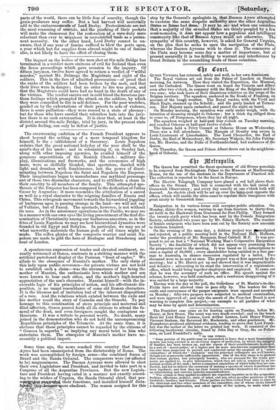The overweening tmbition of the French President appears to shoot
beyond the setting up of a mere temporal kingdom for himself, to the e .tablishment of a theocracy. Louis Napoleon ordains that the great national holyday of the year shall be the saint's-day of his uncle : and in solemnizing it, on Sunday last, along with other imposing agencies, he availed himself of the gorgeous superstitions of the Romish Church : military dis- play, illuminations and fireworks, and the ceremonies of high mass, were so skilfully blended, that spectators, dazzled with light and drunken with frankincence, lost the power of discri- minating between Napoleon the Saint and Napoleon the Emperor. Their imaginations began to manufacture one mythical personage out of those two dissimilar characters, and to attribute a share in their sanctity to all members of the family. This attempted apo- theosis of the Emperor has been compared to the deification of Yulrus CEesar by Augustus : it more resembles the attribution of a sacred as well as a royal character to the reigning families of Russia and China. This retrograde movement towards the hierarchical jqggling of barbarous ages, is passing strange in the land—we will not say of Voltaire, but of Pascal. The spectacle, however, is not without its uses. As in the missionary operations in the Pacific, we may see in a manner with our own eyes the living presentment of the first dis- semination of Christianity among our barbarous ancestors, so in the ktes of Louis Napoleon we may see how hierarchical dynasties were founded in old Egypt and Babylon. In particular, we may see of what unworthy materials the human gods of old times might be made. The reflex glories of the composite warrior and saint Na- poleon are made to gild the hero of Boulogne and Strasbourg and roué of London.


























 Previous page
Previous page